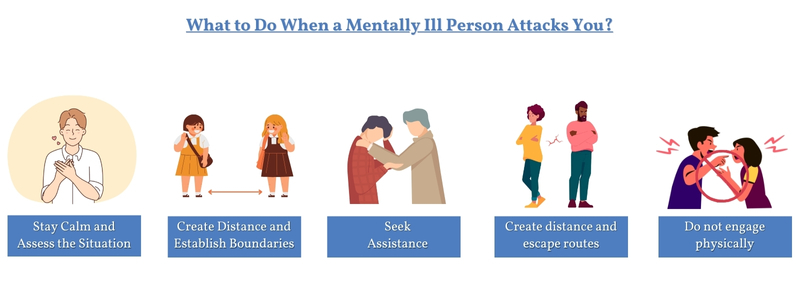
Mood Stabilizer vs. Antidepressant: Understanding the Difference
Mood Stabilizer vs. Antidepressant: Understanding the Difference Get Instant Relief Now! Get Instant Relief Now! When it comes to managing mood disorders, two common types

When it comes to the question of when to walk away from someone with mental illness, it’s crucial to approach the topic with empathy, understanding, and awareness. Mental illness encompasses a wide range of conditions that affect a person’s mood, thinking, and behavior. While supporting someone with mental illness can be incredibly rewarding, it can also be challenging and emotionally taxing.
Studies suggest that maintaining healthy boundaries is essential for both the individual with mental illness and their loved ones, as it can help prevent burnout and maintain overall well-being.
Research highlights the significance of accessing appropriate support networks and resources to ensure the best possible outcomes for everyone involved.
Mental illness can significantly impact the dynamics of a relationship, affecting communication, trust, and emotional intimacy. Research indicates that individuals with mental illness may experience difficulties in forming and maintaining healthy relationships due to symptoms such as mood swings, social withdrawal, and difficulty expressing emotions.
Similarly, partners, family members, or friends of those with mental illness may struggle to understand and cope with the complexities of their loved one’s condition. Despite these challenges, studies emphasize the importance of open communication, empathy, and mutual support in fostering healthy relationships amidst mental health struggles.
Effective communication and a willingness to seek help and support can strengthen relationships and promote overall well-being for both individuals involved.
Identifying signs of mental illness is crucial for early intervention and support. While symptoms can vary widely depending on the specific condition, there are some common indicators to be aware of. It’s important to note that experiencing one or more of these signs does not necessarily mean someone has a mental illness, but they may warrant further evaluation by a healthcare professional.
Deciding when to consider giving up on someone with mental illness is a deeply personal and complex matter that requires careful consideration and compassion. It’s important to acknowledge the challenges and limitations that can arise when supporting a loved one with mental illness.
While it’s natural to want to offer unwavering support, there may come a point where the well-being of both parties needs to be prioritized. This decision should never be made lightly and often involves seeking guidance from mental health professionals, support groups, and trusted individuals.
Ultimately, the goal is to ensure the best possible outcomes for all involved while recognizing the importance of self-care and setting healthy boundaries.
Experiencing an attack from a mentally ill person can be a frightening and distressing situation, but it’s essential to respond calmly and prioritize safety for yourself and the individual involved.
If you find yourself in such a situation, here are some tips to consider:

Stay Calm and Assess the Situation: Take a deep breath and try to remain composed. Assess the severity of the attack and any potential danger to yourself or others nearby.
Create Distance and Establish Boundaries: If possible, create physical distance between yourself and the person attacking. This may involve stepping back or finding a safe space to retreat to. Clearly communicate boundaries and avoid escalating the situation with aggressive behavior.
Seek Assistance: If the situation is escalating or you feel unsafe, seek assistance from others nearby. This could involve calling for help from bystanders, contacting emergency services, or asking for assistance from trained professionals such as law enforcement or mental health crisis teams.
Create distance and escape routes: Try to move away from the person and identify potential exits or safe spaces. If escape is possible, do so safely and without hesitation.
Do not engage physically: Trying to fight back can put you in more danger.
Walking away may be a valid option in extreme cases, but prioritizing your well-being doesn’t have to equate to complete disengagement. Exploring healthy boundaries and support systems can benefit both parties.
Unrelenting Abuse:
You experience consistent emotional, verbal, or physical abuse, regardless of the person’s mental state. No one deserves abuse, and your safety and well-being are top priorities. Seek external support and consider professional guidance to navigate the situation.
Refusal of Treatment:
Despite your encouragement and support, the person consistently refuses professional help for their mental illness. While you cannot force treatment, consider setting respectful boundaries and seeking support for yourself to manage the impact on your well-being.
Neglecting Self-Care and Responsibilities:
Their mental illness significantly impacts their ability to care for themselves or fulfill essential responsibilities, jeopardizing their well-being and potentially yours. Encourage professional help, but also consider seeking support groups or resources to equip yourself for healthy interactions.
Toxic Dynamics Impede Personal Growth:
The dynamic between you becomes increasingly destructive, hindering your individual growth and happiness. While offering support is important, prioritize your own well-being. Seek professional guidance to explore setting healthy boundaries and establishing a dynamic that fosters mutual support and growth.
Coping with a spouse’s mental illness can be an incredibly challenging and emotionally draining experience, often taking a significant toll on one’s own mental and physical well-being. Feelings of helplessness, frustration, and exhaustion can become overwhelming as the demands of supporting a loved one with mental illness accumulate.
It’s common for spouses to experience a range of emotions, including sadness, anger, guilt, and even resentment, as they navigate the complexities of their partner’s condition. The strain of caregiving can lead to feelings of isolation and burnout, impacting various aspects of life, including relationships, work, and personal health.
Seeking support from friends, family, support groups, or mental health professionals is essential for maintaining one’s own well-being while caring for a spouse with mental illness.
Establishing boundaries, practicing self-care, and prioritizing one’s own needs are crucial steps toward preserving one’s mental and emotional health amidst the challenges of supporting a spouse with mental illness.
Living with a spouse who is mentally unstable can take an immense toll on one’s emotional and physical health, often feeling like a constant battle that drains every ounce of energy.
The challenges of supporting a partner with mental illness can lead to feelings of overwhelming stress, anxiety, and despair. Witnessing the struggles and suffering of a loved one can evoke a profound sense of helplessness and grief, amplifying the emotional burden.
It’s essential for spouses in such situations to recognize their own needs and seek support from trusted individuals, therapists, or support groups. Taking proactive steps to prioritize self-care and establish healthy boundaries is crucial for preserving one’s well-being while navigating the complexities of living with a mentally unstable wife.
When you find yourself unable to help someone you love, particularly when they are struggling with mental illness, it can be a deeply distressing and disheartening experience. Despite your best efforts and intentions, there may be limitations to the support you can offer, leaving you feeling helpless and frustrated.
It’s important to acknowledge that you cannot single-handedly solve their problems or alleviate their pain, and sometimes, the best way to help is by encouraging them to seek professional assistance or support from other resources.
While it’s natural to want to fix things for your loved one, accepting your own limitations and focusing on offering compassion, understanding, and encouragement can ultimately be the most meaningful form of support.
It’s essential to approach these situations with empathy, understanding, and patience, recognizing that the path to supporting a loved one’s mental health is not always straightforward. Setting boundaries, practicing self-care, seeking professional help when needed, and fostering open communication are key elements in providing effective support while also preserving one’s own well-being.
Remember that you are not alone in this journey, and there are resources and communities available to offer guidance, encouragement, and solidarity. By prioritizing compassion and understanding, we can create environments that promote healing, resilience, and hope for individuals and their loved ones affected by mental illness.

Mood Stabilizer vs. Antidepressant: Understanding the Difference Get Instant Relief Now! Get Instant Relief Now! When it comes to managing mood disorders, two common types

Understanding Antisocial Behavior: Exploring Its Causes and Solutions Get Instant Relief Now! Antisocial behavior is a complex phenomenon that encompasses a range of behaviors characterized

Schizoaffective Disorder vs Schizotypal Get Instant Relief Now! Schizoaffective disorder and schizotypal personality disorder are both complex mental health conditions that can significantly impact individuals’
